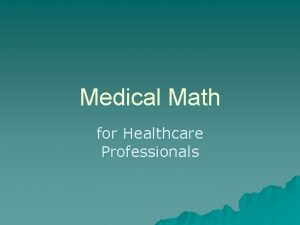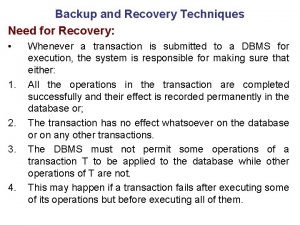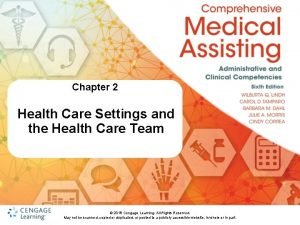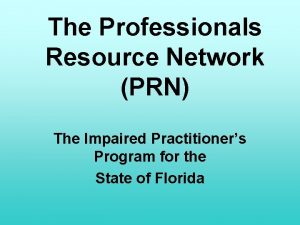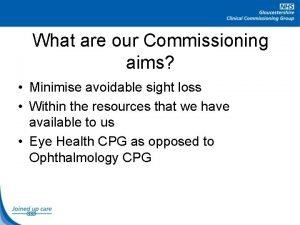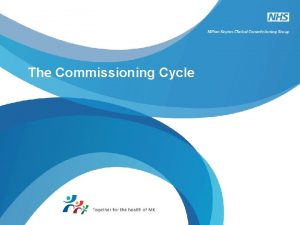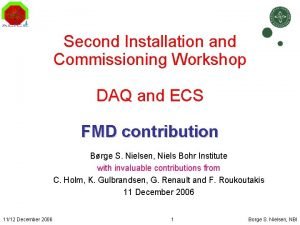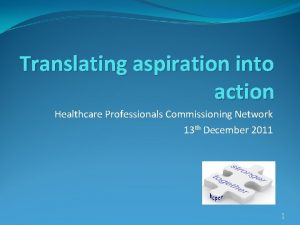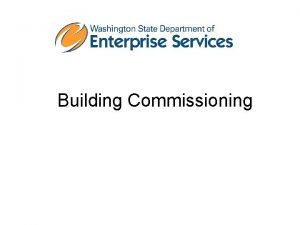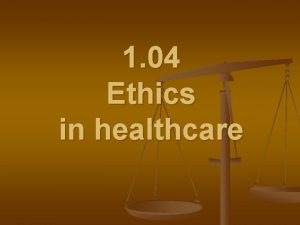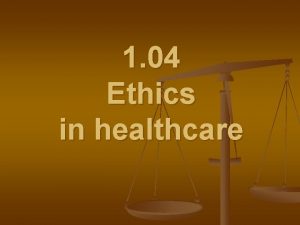Healthcare Professionals Commissioning Network Update Stephen Foster Network









- Slides: 9

Healthcare Professionals’ Commissioning Network Update Stephen Foster, Network Lead, Healthcare Professionals’ Commissioning Network

History of the Network l l l Initial meeting in March 2010 at the British Library with James Kingsland Edna Robinson Seven of us started the network Now more than 335 members! Hosted by NHS Networks and managed by Katherine Andrews Tied in with PCC – Julian Patterson, Helen Northall

Aims of the Network l l l To ensure that PBC (and now GP Commissioning) is truly a multi-disciplinary primary care approach Georgina Craig – “we all have an important piece of the jigsaw to add” 10 Key Messages for Commissioners Andrew Lansley – “GP Commissioning is about General Practice, not just about General Practitioners” View is firmly endorsed by DH HCPCN as a formal sub-group of the National Clinical Commissioning Network (JK)? ? ?

The ten high impact actions for commissioners l l l Create the right culture. Create an open, collaborative culture now. Given health care is a complex jigsaw, acknowledge that there are things GP commissioners may not know or don’t know and need to know in order to make good commissioning decisions. Have an open door policy. Welcome and actively encourage approaches from health care professionals who want to engage with the development of GP commissioning. Involve people from the start. People support things they help to create. When people have an input from the beginning, everyone benefits from the collective insight and information. It creates shared ownership of decisions. Understand how your community really uses health services. Research and understand which health and social care professionals (other than GPs) people have regular contact with and get support from. This is an important part of needs assessment. Use this information to inform commissioning. Build on these interactions and relationships. They are a valuable and underused asset. Expect everyone to deliver the right care. Set ambitious and explicit expectations that everyone across the system needs to focus on delivering ‘the right care’ (right place, right people, right intervention, right outcomes). Promote and nurture innovation amongst providers, including new approaches to skill mix.

The ten high impact actions for commissioners (continued) l l l Build local multi professional relationships. Prioritise the development of local multidisciplinary networks across providers and commissioners. Engage a wide range of health care professionals, providers and health care partners in service redesign, commissioning and provision of services. Encourage multidisciplinary clinical leadership. Work with clinical leaders across the health professions to drive transformational change, quality improvement and challenging peer review. Copy, improve and pass on good practice. Most things have been done already somewhere else; often led by other health care professionals. If it works there, it will work locally too. There is no need to reinvent the wheel. Plagiarism success should be embraced and extended. It saves time and money. Encourage and enable shared CPD. People who learn together work well together. Take a lead role and responsibility for increasing understanding amongst all local health care professionals about what GP commissioning entails and how everyone has a part to play in making it a success. Consider sharing budgets. Where healthcare professionals e. g. optometrists or dentists refer directly or indirectly (via general practice) to secondary care, consider how to share responsibility for budgets. Develop agreements for direct referral to reduce transaction costs. Give them the freedom to test innovative approaches that minimise referral in order to keep care in the community.

Professional Leads l l l l NCCN – James Kingsland HCPCN – Steve Foster Pharmacy – Liz Stafford Nursing – Debra Sprague Dentistry – Reena Patel Optometry – David Hewlett AHP – Paul Hitchcock

Successes so far… l l Jonathan Mason (National Clinical Director for Community Pharmacy) has suggested that all the individual professions feed their clinical leadership networks through the HCPCN – starting with Pharmacy Christine Beasley (Chief Nursing Officer) has agreed to adopt the “ten high impact actions” within the nurses’ commissioning groups – representation through Robert Tunmore Conference call with Barry Cockcroft (CDO) – agreed to endorse HCPCN and write something in next CDO bulletin Conference call with Karen Middleton (Chief Health Professions Officer) – agreed to endorse HCPCN; article written for next bulletin

Successes so far (continued)… l l l Two papers have been presented to Ben Dyson (Director of Primary Care, DH) in response to consultations Sir Muir Gray (Right Care work-stream lead) has approached us to help develop a strategy for COPD Letters printed in HSJ

Aims of Today l l To agree the way to move our work forwards Professional Leads to develop and enhance their uni-disciplinary networks Need to do something, not just talk about it! “Stronger Together”…. !
